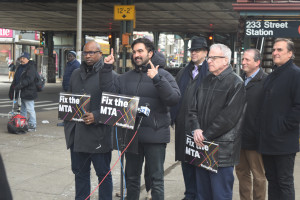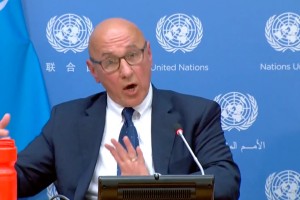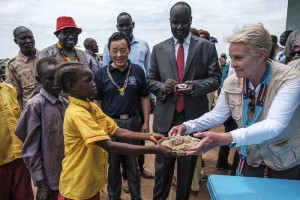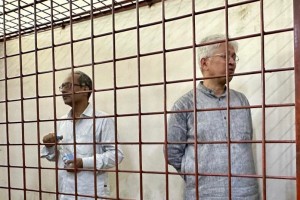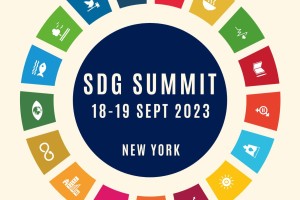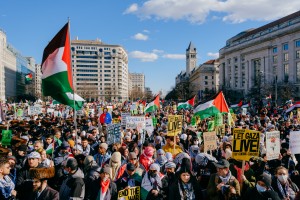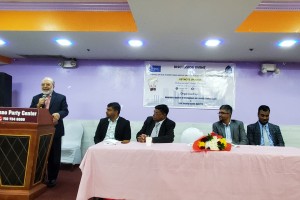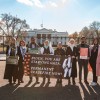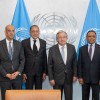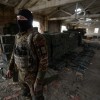Secretary Blinken interview with Jake Tapper of CNN State of the Union
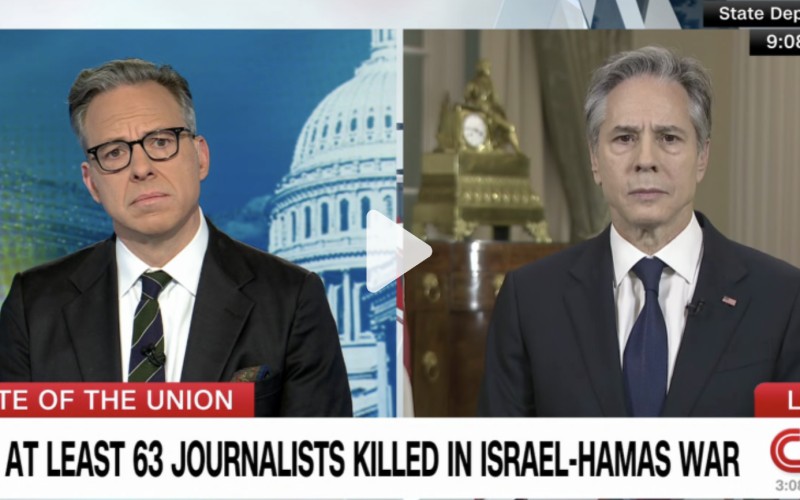
Coming up on CNN State of the Union, an exclusive interview with Secretary of State Antony J. Blinken. Tune in as Jake Tapper sits down with Secretary Blinken to discuss the latest developments in Washington, D.C. It's a conversation you won't want to miss, right here MNN.
QUESTION: Joining me now is Secretary of State Antony Blinken. Mr. Secretary, thanks for joining us. So the U.S. stood alone at the UN Security Council on Friday to block the ceasefire, and the administration is sidestepping Congress to rush more weapons to Israel. You said this week there is, quote, a “gap between … the intent to protect [Palestinian] civilians, and the actual results that we’re seeing on the ground” in Gaza. Can you describe that gap? What is Israel doing right now that you think does not demonstrate enough care or protection of Palestinian civilians?
SECRETARY BLINKEN: Jake, we think there needs to be a premium put on protecting civilians and making sure that humanitarian assistance can get to everyone who needs it. And as I said, I think the intent is there, but the results are not always manifesting themselves. And we see that both in terms of civilian protection and humanitarian assistance. We want to make sure that as Israel continues this this campaign – because remember, they are dealing with a terrorist organization that engaged in the most vicious possible brutality on October 7th and has made clear that it would do it again and again and again if given the opportunity. So Israel needs to be able to deal with this, to protect itself, to prevent October 7th from happening again. But as it does that, it’s imperative that civilians be protected. And here, the critical thing is to make sure that the military operations are designed around civilian protection and to focus on that.
When it comes to humanitarian assistance, we, as you know, made the argument many weeks ago to get humanitarian assistance in. It started to flow. We got it doubled during the humanitarian pause for the hostage releases that we helped to negotiate. But now what’s critical is this: Even as Israel has taken additional steps – for example, to designate safe areas in the south; to focus on neighborhoods, not entire cities in terms of evacuating them – what we’re not seeing sufficiently is a couple of things.
One, making sure that the humanitarian operators who are there, starting with the United Nations, performing heroically, that there are deconfliction times, places, and routes so that the humanitarians can bring the assistance that’s getting into Gaza to the people who need it. Similarly, we need to see the same kind of deconfliction time, pauses, designated routes – plural, not just one – and clarity of communication so that people know when it is safe and where it is safe to move to get out of harm’s way before they go back home. These are the kinds of things we’re working on every single day, again, to make sure that that gap between intent and result is as narrow as possible.
QUESTION: The IDF told CNN – I believe Alex Marquardt – earlier today that they estimate they’ve killed about 7,000 Hamas fighters. When do you anticipate this phase of Israel’s military campaign is going to end? Obviously, they can’t kill every member of Hamas, and even if they did, 150,000 new ones would show up the next day. Are the Israelis telling you anything about when this phase is going to wrap up? Because obviously, the civilian death toll is mounting; it’s unimaginable. Secretary Austin suggested that Israel might ultimately be facing a strategic defeat by chasing so many Palestinians into the arms of Hamas.
SECRETARY BLINKEN: Jake, we have these discussions with Israel, including about the duration as well as how it’s prosecuting this campaign against Hamas. These are decisions for Israel to make, but Hamas has decisions to make too. It could get out from hiding behind civilians tomorrow.
QUESTION: Right.
SECRETARY BLINKEN: It could put down its arms tomorrow, it could surrender tomorrow, and this would be over.
QUESTION: Right, obviously, but will the U.S. continue to back Israel the way it’s backing Israel right now if this continues for months and months, as opposed to days or weeks?
SECRETARY BLINKEN: Again, Israel has to make these decisions. Of course, everyone wants to see this campaign come to a close as quickly as possible. But any country faced with what Israel is facing, a terrorist organization that attacked it in the most horrific way possible on October 7th – and as I said, has said repeatedly that it would do it again and again and again – it has to get to the point where it is confident that that can’t be repeated.
But you make another point that’s very important. When the major military operation is over, this is not over, because we have to have a durable, sustainable peace, and we have to make sure that we’re on the path to a durable, sustainable peace. From our perspective, I think from the perspective of many around the world, that has to lead to a Palestinian state. This is – we’re not going to have durable peace, we’re not going to have durable security for Israel unless and until Palestinian political aspirations are met. And of course, what happens the day after in Gaza itself once the military operation’s – major military operation’s over – that’s also hugely important and urgent to make sure that governance, security, reconstruction, all of that is in place so that there’s no vacuum.
QUESTION: The Committee to Protect Journalists says at least 63 journalists and members of the news media have been killed, 56 of them Palestinian, in this war, presumably, mostly if not entirely by IDF strikes. Is that acceptable to you? You’ve made press freedom a hallmark of your term. How do you explain all these deaths of journalists? How do the Israelis explain it?
SECRETARY BLINKEN: Jake, as I see journalists, including some of your colleagues but also from many other news organizations, putting their lives on the line to just bring the news, bring the facts, bring information to the world, I have extraordinary admiration for what they do, for the courage that they show, and for the vital importance of their mission. And we want to make sure that, just as every civilian is protected to the greatest extent possible, of course, journalists are too. And there – when it comes to instances where journalists have been killed, we want to make sure that that’s investigated and we understand what’s happened and there’s accountability.
QUESTION: Congress is scrambling to reach a deal to pass foreign aid for Ukraine and Israel. Republicans are insisting on more border funding and new asylum restrictions, that that be added to the bill. What would it mean for Ukraine and Israel if Congress does not pass any additional support by the end of the year? And why not agree to tougher border protections, which is an issue of national security as well?
SECRETARY BLINKEN: Well, Jake, the border piece, as you know, is out of my purview. But I can say this. I know on day one of this administration, or at least day two, the President put before Congress, I think, a first bill on immigration reform. Unfortunately, Congress hasn’t acted on that. In this request for additional funds, there are $6 billion to enhance border security, including having more people, more agents on the border. So I know that’s very much part of the discussion and something the President’s fully prepared to engage on.
But in terms of what it would mean for Ukraine, what it would mean for Israel, what it would mean for our efforts to be competitive in the Indo-Pacific – I think the only people who’d be happy if this supplemental budget request is not voted on and approved by Congress are sitting in Moscow, sitting in Tehran, sitting in Beijing. For Ukraine, this is absolutely vital. They’ve made remarkable progress over the last year in pushing back Russian aggression, taking back more than 50 percent of the territory that was seized since February of 2022. But they’re in a ferocious battle now in the south and the east. We are running out of funding for them.
By the way, 90 percent of the assistance, the security assistance that we provided Ukraine, is actually invested right here in the United States to our companies, to our manufacturers. Similarly, we’ve had extraordinary burden sharing with our allies and partners. We’ve provided very significant assistance, about $70 billion over the last two years. Our European friends and partners beyond Europe: more than $110 billion for Ukraine. So we have the burden sharing that we need.
This is a time to really step up, because if we don’t, we know what happens. Putin will be able to move forward with impunity, and we know he won’t stop in Ukraine, and he may well end up going after a NATO country. That would bring us in given our obligations to our NATO Allies. So here, an ounce of prevention is really worth 10 pounds of cure.
QUESTION: Antony, as you know, CNN has led the coverage when it comes to the evidence mounting in Israel of rapes and sex crimes committed by Hamas against women and girls, maybe even against men on October 7th. Why do you think the United Nations and the international community has been so slow to condemn these atrocities? I can’t think of a real reason – well, let me just put it this way. I’ve heard antisemitism hypothesized as a reason why the UN and the international community might be so slow to acknowledge this. What do you think?
SECRETARY BLINKEN: Jake, first, I really applaud the extraordinary work of CNN in bringing this to light and bringing this before the world. You’ve performed a remarkable service in doing that. As to your question, I don’t have an answer. I don’t know why countries, leaders, international organizations were so slow to focus on this, to bring it to people’s attention. I’m glad it’s finally happened. The atrocities that we saw on October 7th are almost beyond human description or beyond our capacity to digest. And we’ve talked about them before, but the sexual violence that we saw on October 7th is beyond anything that that I’ve seen either. So thank you for doing that, and look, I don’t have a good answer to that question. I think it’s a question that these organizations, these countries need to ask themselves.
QUESTION: Secretary of State Antony Blinken, thanks for joining us today. Appreciate it.
SECRETARY BLINKEN: Thanks, Jake. Good to be with you.





